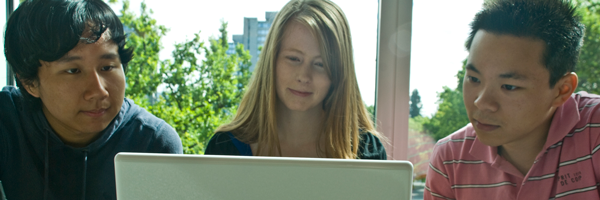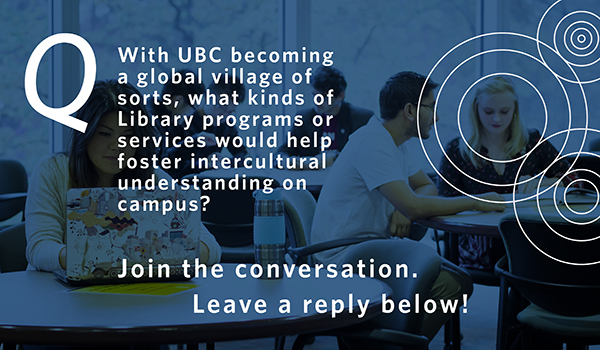
The Library’s Tech Training program helps international students get IT-savvy.
This story appears in UBC Library’s 2013/14 Community Report. Read more to find out how we’re supporting economic, environmental and social sustainability at UBC.
You’ve spent most of your life in a refugee camp halfway around the world. You’ve also just been accepted to start at UBC next September.
Now what?
The international student experience often begins with digital instructions on an array of topics: tuition, registration, email accounts, course accessibility and more. Students are also typically assumed to have basic tech competencies for the 21st-century classroom – but that isn’t always the case.
“With students from 151 countries, it’s important to be mindful of context in that students coming from different places may be coming from varying degrees of experience and access to technologies,” says Michelle Suderman, Associate Director, UBC International Student Development.
Enter UBC Library as an intercultural bridge. For the last two years, the Library’s Chapman Learning Commons (CLC) has provided a customized Tech Training program to UBC students from the World University Service of Canada Student Refugee Program (WUSC-SRP). The program is delivered by a CLC student assistant and Julie Mitchell, the CLC Managing Librarian.
International students are offered an overview of technology basics – including email platforms, understanding the differences Macs and PCs, course management programs (such as Connect), scanning and printing, and software programs available at UBC Library. The program accelerates technology fluency and inspires confidence, thanks to new-found skills that can be applied immediately in course assignments and research.
“Growing up in a refugee camp in Kenya limited my ability to access technology,” acknowledges Rhoda Philip, an undergraduate science student who took the program last year upon arriving in Vancouver. “Everything is about technology here.” After a couple of weeks of training, Philip felt more at ease, thanks to the program and the peer-to-peer learning experience that it fosters.
Cameron Frayne, a CLC student assistant who co-developed the Tech Training program, said several students are requesting more advanced program services – which could include instructions for tech tools and programs such as Adobe Illustrator, HTML and data visualization.
The program also fosters a spirit of community – some students participate in Tech Training development, while others promote the program to the next crop of WUSC-SRP students. The program will begin its third year in fall 2014.

Kudos to the Chapman Learning Commons Tech Training program. Indeed, it’s helping UBC WUSC-SRP students access and benefit from UBC’s robust library services and facilities in order to meet their personal and career development goals and broader learning outcomes.
As someone who serves UBC’s richly diverse student populations, I see possibilities for the UBC Library to continue to be a bridge for intercultural understanding.
To me, libraries are incubators of imagination for they house materials that open up old worlds, and give us a glimpse into new worlds yet to be found.They are places where inquiry and ideas collide into new realms of innovation. They are also places where people of all walks of life can meet in the pursuit of knowledge.
I believe it’s in the UBC Library offering services and programming that seeks to tease out different worldviews, ways of being, and value systems that it can continue to foster intercultural understanding on a global campus like ours.
For example, wouldn’t it be fascinating to engage in programming that draws from the experiences of people like the WUSC-SRP Students who can give us new insights into educational experiences in diverse contexts, or student perceptions of indigenous educational curriculum, pedagogy, and systems compared to what we find in BC or across Canada.
How exciting would it be if the UBC Library offered access to more materials found in libraries from around the world in languages like Amharic, Luo, Tagalog, Mingrelian, Mossi, or Maori, to name a few. Wouldn’t it be fascinating to participate in programming where students and/or alumni, as local language speakers of said texts gathered and shared their perspectives on how they understood and gave meaning to the knowledge found within these texts through their indigenous voices.
I think the possibilities are only bounded by our imaginations…
Hi Peter,
Thanks so much your suggestions – they are great starting points for the Library to pursue! We have also had conversations with Alden Habacon, UBC’s DIrector of Intercultural Strategy on how we can further explore intercultural fluency with undergraduate and graduate students. I believe he expressed it best when he commented on the library being a natural gathering point for this kind of programming.
On the subject of languages, we’re working on some interesting projects including the Aboriginal Audio Digitization and Preservation Program (https://about.library.ubc.ca/2014/01/07/digitizing-aboriginal-knowledge/) that preserve valuable oral histories, traditions and culture.
Would love to hear any other suggestions from others on and off campus on how we can support intercultural fluency!